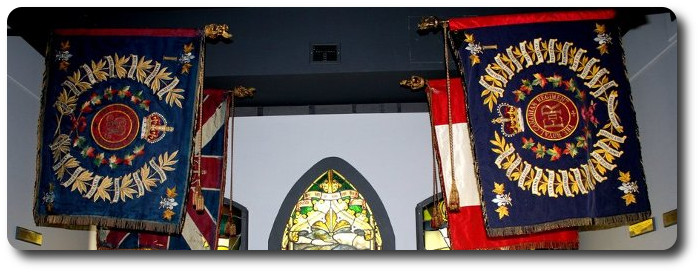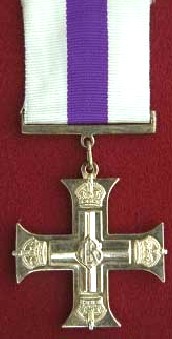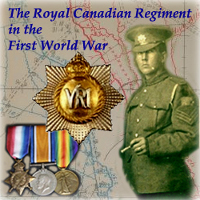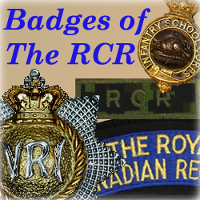
Researching The Royal Canadian Regiment

Lieutenant William Godfrey Wurtele, M.C., R. Can. Regt., Nova Scotia Regt.
For conspicuous gallantry during eight days of of the operations, in which he commanded his company. He led it in an attack, and his dashing leadership was largely responsible for the rout to which the enemy was put. He captured five 4.2 guns, six machine guns, and sixty prisoners. during a night attack on a village his company cleared it of the enemy under very difficult conditions. He set a splendid example to his men by his initiative and personal courage.
Source: Supplement to The London Gazette, 11 January, 1919
Amiens - August 1918
By: Lieutenant W.G. Wurtele, M.C.
(Reproduced from Pro Patria Issue No. 33, August 1977)
In March 1918 the Germans, in a desperate effort to finish the war, before the American Army arrived in sufficient numbers to have any more than the token effect their unpreparedness had exerted up till now, used the troops released by the collapse on the Eastern Front and everything else they could muster, put on a sustained and almost suicidal offensive against the British Army on the old Somme battlefields. The Canadian Corps at Vimy Ridge, to the North, was not actively engaged, except for isolated units, consequently they were required to spread out in length and depth. The Royal Canadian Regiment, for example, remained in the front line and forward area for 56 days and at times our line was so thinly held as to leave up to one hundred yards between men. We could not get back for a bath or change of underwear or socks for the full 56 days.
Platoon and Company Commanders had anxious times checking that the Germans had not infiltrated unopposed, between the large gaps, and were not themselves ambushed by Germans laying on the parapets.
After this, in May, the Canadian Corps pulled right out to the reserve areas to recuperate and undergo intensive training in open warfare. There was one exception and this was a short tour of front line duty on the Arras front. We moved from this front at night. to maintain security, to the Amiens front where the Royal Canadian Regiment were billeted in a small town called Freville; promptly changed to "Flyville" because of the heavy concentration of all types of flies. I never found out the nationality of the troops who had occupied the billets before us but most certainly their sanitary arrangements left much to be desired. We had to lean low over our meals to ward off the dead flies which were constantly dropping from the ceilings. To add to our misery no one was allowed outside during daylight hours to maintain secrecy. The quarters were very cramped and I can assure you no one enjoyed "Flyville". Our only diversion was the receipt of detailed orders which the Company Commanders took around to the various buildings and there briefed all ranks on their future respective roles.
Finally, as dusk fell on the 7th of August, we moved out of "Flyville" and amid the utmost orderly confusion we reached Gentilles wood which was only about 3 miles from the River Luce, which, with its marshes, was the front line. The reason for all the secrecy became very apparent as every square foot of that Wood was filled with troops and a concentration of fire from the very adequate German Artillery could have wrecked havoc, including our artillery. which was concentrated a short distance ahead of Gentilles Wood.
The Royal Canadian Regiment were in the second wave of the attack and this gave us some concern as we assumed the arrival of the first wave (9th Canadian Infantry Brigade) would set all hell loose, particularly on the narrow long bridges we depended on to get us over the River Luce and marshes. On the immediate right was the French Army who had compromised to a ninety minute instead of a three-hour concentrated shelling before they advanced. This meant our right flank (largely the Amiens-Roy Road) would be exposed for ninety minutes, as the British tactics then were to jump off with the first shell. This gave us a grand-stand view of the Franco-German fight and fortunately for us the German inflexibility of sticking to their own areas prevented them from firing at us.
However, to get back to our own advance. At 0400 hours we left Gentilles Wood and just as we were passing through a narrow gap in our gun position line at 0420 hours we got the shock of our lives when everyone of the hundreds of guns open- ed up with a tremendous roar, but surprise was so complete that there was very little retaliation, and we crossed the bridges without casualties, at least in so far as my company was concerned.
The 8th Canadian Infantry Brigade advanced according to schedule and we in turn came up and passed through them on time and soon came upon something we had never experienced in an offensive before; trees in leaf and green grass, a most welcome change. We had a few casualties, mainly from snipers in the trees, which we disposed of as quickly as we could locate them. Here I have a confession to make. About one third of the way to our objective we came upon a section of a German 4.2 Artillery Battery with two guns still hot, situated on high ground overlooking the ground we still had to take including a walled "maison blanc" farm which looked like an ideal German stronghold. In spite of the Hague Convention I intimidated a young German who spoke English to reveal that it was manned by German machine guns, in spite of his efforts to reveal only his rank, name and serial number. We still had only one of the fifteen tanks that were to support us (all other were casualties due to engine failure) and we got this one to put about 40 or 50 of his two pound shells into the "maison blanc" and some 40 Germans immediately went beetling down the road, abandoning their position. This wiped out any remorse I may have had, as these Germans, with the 10 or 12 machine guns they left behind could have wiped out a lot of our men and held up the advance.
We could see the Germans across the Amiens-Roy Road and their forming up to repulse the French but it was not until we had firmly established ourselves on our objective that I decided to offer two of my four Lewis guns to A Company, on my right, to interfere with their forming up process. At the same time we established liaison with the 42nd Battalion (Royal Highlanders of Canada) on my left and this is where I first met Major C.B. Topp who was in charge of their forward troops. He was examining one of his kilted men in terrible agony. It was the result of a smoke shell falling at his feet, and the intense heat cooking the inside of his legs and crotch. His scrotum, penis and testicles were small cinders and he was not reacting to the limited amount of morphine carried by their stretcher bearers. I sent over some of our own morphine but Topp never knew whether or not he survived. I would say he did not.
Shortly afterward we saw the cavalry, supported by whippet tanks, attacking Beaucourt-en-Santerre on our left front which appeared to be intact. Shortly afterwards riderless horses came back through our lines as the impenetrable wire made that attack a failure. But on this bright day it was a very spectacular sight. It was also here that we rooted out a cashier trying to get away with two sacks of German notes. He did not get far and some of our more prudent men stuffed their haversacks and those that kept them came back to Canada quite wealthy.
About 1130 hours the 4th Canadian Division was ordered up to exploit success and they passed through. They did not get very far before being halted by a hastily prepared defence. Although hungry and dead tired, from coming some fifteen miles and little sleep in Gentilles Wood, we moved forward about three miles and settled down in a much less exposed position. My batman stumbled on a small shallow dug-out with a chicken wire bunk but neither of us noticed an annex, with a cow, until the next morning when we were awakened by her bellowing to be relieved of the milk from her overflowing udders, which provided milk for some 30 to 40 soldiers.
After a few days there we moved on to where the original Somme front line had held up two determined dawn attacks. I will never forget going up to receive our orders with two other company commanders and their runners. This required going through a maze of old trenches to what was to be our jumping off positions at mid-night. I marked my route up by sticking German tin hats on bayonets, at many points, there some idiot removed them. As the two other Company Commanders remained on the scene and my runner was wounded by a sniper it fell on me to lead the three companies to the salient which had been secured in the old German front line. The removal of the German tin hats got me into a terrifying funk trying to lead three companies in the dark to our destination.
A German plane came over and dropped flares as we were crossing the 1000-yard gap in the old "no man's land". Why he did not spot the long line of troops I will never know, but we got up there unmolested. My Company was to mop up but as we were about to advance a Private from the leading Companies, devoid of rifle and equipment, came back in a terrible state. We were able to make out that he was the "sole survivor".
After a short hesitation we jumped off but never saw any indication of the two leading companies right up to our objective in Parvilliers. We ran in and took many German prisoners; here aga1n the element of surprise paid off by our night attack. They had already repulsed some three or more daylight assaults.
About half way to our objective at Parvilliers and still apprehensive over the terrified soldier who stumbled into our jumping off trench, the presence of Germans who readily surrendered and the complete lack of any trace of the two leading companies I paused in a deep trench to consult my map with the aid of a lighted cigarette. I heard the clomp-clomp of approaching footsteps followed by a six foot German towering over me. He grabbed his slung rifle from his shoulder and I grabbed my revolver from my lap and let him have it right between the eyes. What a mess, but this did not relieve the funk I was in.
Shortly after first light at Parvilliers when we had rounded up about twenty prisoners, some wounded, a soldier dressed as a Royal Engineer (Imperial) came up and demanded that I evacuate, on humanitarian grounds, the wounded German prisoners. We already had had our hands full and I was more than a little suspicious as to why an Imperial Major was in our area. I had him searched and disarmed but let him go. My later enquiries failed to illicit any information about him and to this day I am more and more convinced that he was a German who got scared and beetled back to his own side after this experience with us.
All in all, as I remember it, we had less than sixteen casualties in the two attacks out of 130 we had in "Flyville" which was just about the reverse of former battles. "C" Company captured three 4.2 guns, six machine guns and seventy prisoners. It was my first time as a Company Commander in a major battle and a very regarding one as I there gained all the important confidence of the men of my Company.
Contributed by Comrade W.G. Wurtele - then
Lieutenant W.G. Wurtele, M.C.
The Royal Canadian Regiment.
Canadian Expeditionary Force.


